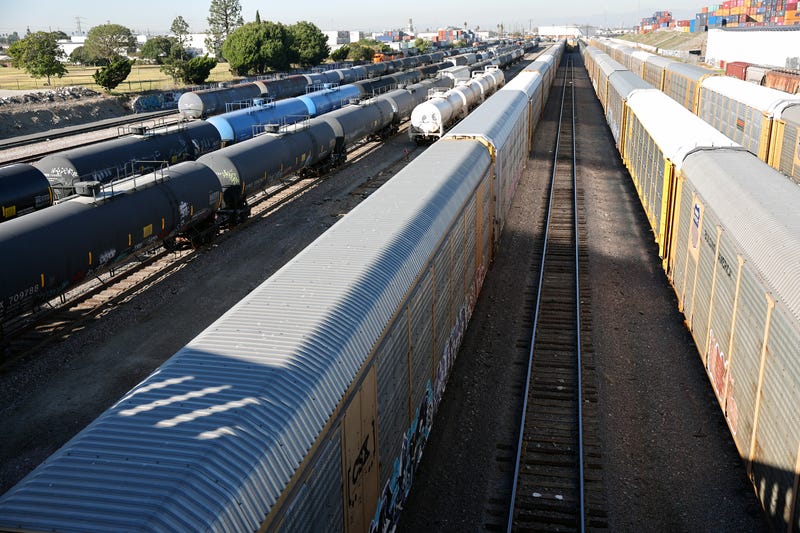
Buffalo, N.Y. (WBEN) - It is a situation the federal government is trying to avoid come Dec. 9: A rail strike that could completely hinder the U.S. economy.
President Joe Biden asked Congress on Monday to intervene and block a railroad strike before next month’s deadline in the stalled contract talks. House Speaker Nancy Pelosi said lawmakers would take up legislation this week to impose the deal that unions agreed to in September.

"It was tentative, and it was not written in granite, as much as Joe Biden wanted to put it out that way. But we're looking at a pretty dire situation here, if ultimately, something doesn't give," said Dave Levinthal, deputy Washington bureau chief for Business Insider on WBEN on Tuesday. "People don't think about rail and freight rail until they absolutely positively need to think about freight rail. People are going to be thinking a whole lot about freight rail if, ultimately, the nation's freight rail system grinds to a halt, especially around the Christmas season."
The agreement in September that Biden and Pelosi are calling for is a slight improvement over what the board of arbitrators recommended in the summer. The September agreement added three unpaid days off a year for engineers and conductors to tend to medical appointments, as long as they scheduled them, at least, 30 days in advance. The railroads also promised in September not to penalize workers who are hospitalized, and to negotiate further with the unions after the contract is approved about improving the regular scheduling of days off.
Hundreds of business groups had been urging Congress and the President to step into the deadlocked contract talk and prevent a strike.
"The parties have been negotiating for many months, the Biden administration has been actively involved in trying to reach a settlement, and they did come up with a package in September, I believe, that they went forward with," said Ken Kruly from PoliticsAndStuff.com. "There's 12 unions involved in the various railroads, eight of them have accepted the settlement that was negotiated in September, and four are resisting. So now the question is if the rest of them can settle, there could potentially be a strike on Dec. 9, and that's where the President's stepping in."
If the railroad unions decide to go on strike come Dec. 9, Art Wheaton - Director of Labor Studies at Cornell University - sees this having a major impact on the economy at all levels.
"The estimates are about $2 billion in losses every single day they're out on strike," said Wheaton. "It could dramatically hurt the shipment of grain, the shipment of hazardous waste, shipment of fertilizer, gasoline and fuel and ethanol. A lot of the things that we ship we shipped by rail, so 30% of all of our goods that are shipped in the U.S. are shipped on rail, and an extended strike could certainly cause a lot of damage to the U.S. economy. That's why there's some special circumstances for the railways and the airplanes for the Railway Labor Act, which is a law that governs it."
If Congress acts, it will end talks between the railroads and the four rail unions that rejected their deals Biden helped broker before the original strike deadline in September. Congress has to impose the settlement, and that takes a majority vote from both the House of Representatives and the Senate.
Where it has put President Biden and other Democrats in a tough position going forward is it has forced them to go against their pro-union beliefs from years past. They are essentially trying to force the end of a rail strike with a deal that if not in place, could have dire consequences on the U.S. economy if a strike ensues.
"While the Democrats would love to give the union their No. 1 issue, which is sick time - they have a horrible, terrible sick time policy that the railway companies jammed down their throat, and they would like to change it - but if any of the Democrats vote to change that language, they would have an extremely tough time in the Senate getting them to bring the law up for a vote," Wheaton said. "So with a razor thin majority and 50/50 even split in the Senate, they really can't change a single word of it without threatening the ability to pass it at all."
"Sometimes people in political office have to make decisions that aren't popular with their constituencies. So Joe Biden has been a very strong union supporter all of his political life, but he feels now with the country and the economic activity of the country, it'll require him to get involved in this," Kruly added.
While there is no guarantee that Congress will, indeed, get together to avert a rail strike, there seems to be strong bipartisan support at some level for this motion to go forward.
"From what I've been reading, [Chuck] Schumer and [Mitch] McConnell are on board in the Senate, Pelosi is on board in the House," Kruly said. "Kevin McCarthy is sort of vague about the thing, and I guess this might be a test of his leadership for a guy who wants to become speaker, but it's going to be up to the members of Congress to pass this, and we'll see pretty soon where are they all stand."
So what can the government realistically do, at this point, to successfully avert this potential rail strike? Wheaton says a decision from Congress can come at any point to try and avoid a strike, even if the unions do call for a strike come Dec. 9.
"It's very realistic that this could avoid this strike, or once the strike starts within a matter of hours, they would say, 'OK, we're ready to sign this into law,' and the strike is over," he said. "It has happened in the past. The last time, I think, was under George Herbert Walker Bush, but it's been a while since we've had one of these. But it's all part of the law that the Congress is the final piece to decide whether they can go out on strike or stay on strike."
So given how the cards are being dealt, or how the writings are being laid out on the walls, how do Kruly and Wheaton see this situation play out in the end? Both seem optimistic, one way or another, that an economic crisis will be avoided and the rail strike will soon come to a close.
"Because of the leadership supporting the movement to settle this strike potential that it's likely to pass," Kruly said. "It sounds like there's bipartisan support in both houses, maybe not necessarily Kevin McCarthy, but probably some Republicans in the House. McConnell on board will certainly help pass it in the Senate, and I think that the odds are pretty good that Congress will impose a settlement."
"If they can't come to a resolution at the bargaining table, the unions could go out on strike on Dec. 9, and Congress will pass it on Dec. 9 and end the strike almost immediately," Wheaton said. "I think there's a very good chance that the workers for the union will be very upset with President Biden because he didn't support their cause, which I personally believe is a true or a good cause for having sick time, but it's a delicate position with a 50/50 split in the Senate and you don't want to have a strike through Christmas and destroy the U.S. economy with our fragile supply chain. So Biden is between a rock and a hard place. He needs to get this resolved without destroying our economy. He'd love to help the unions, but he could never get it passed in the Senate."

